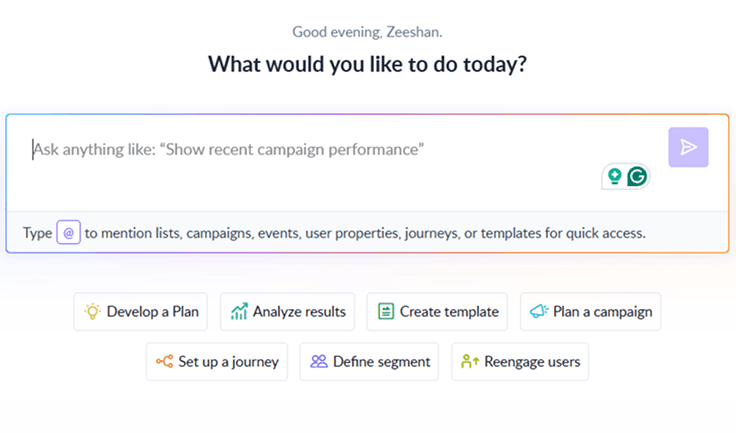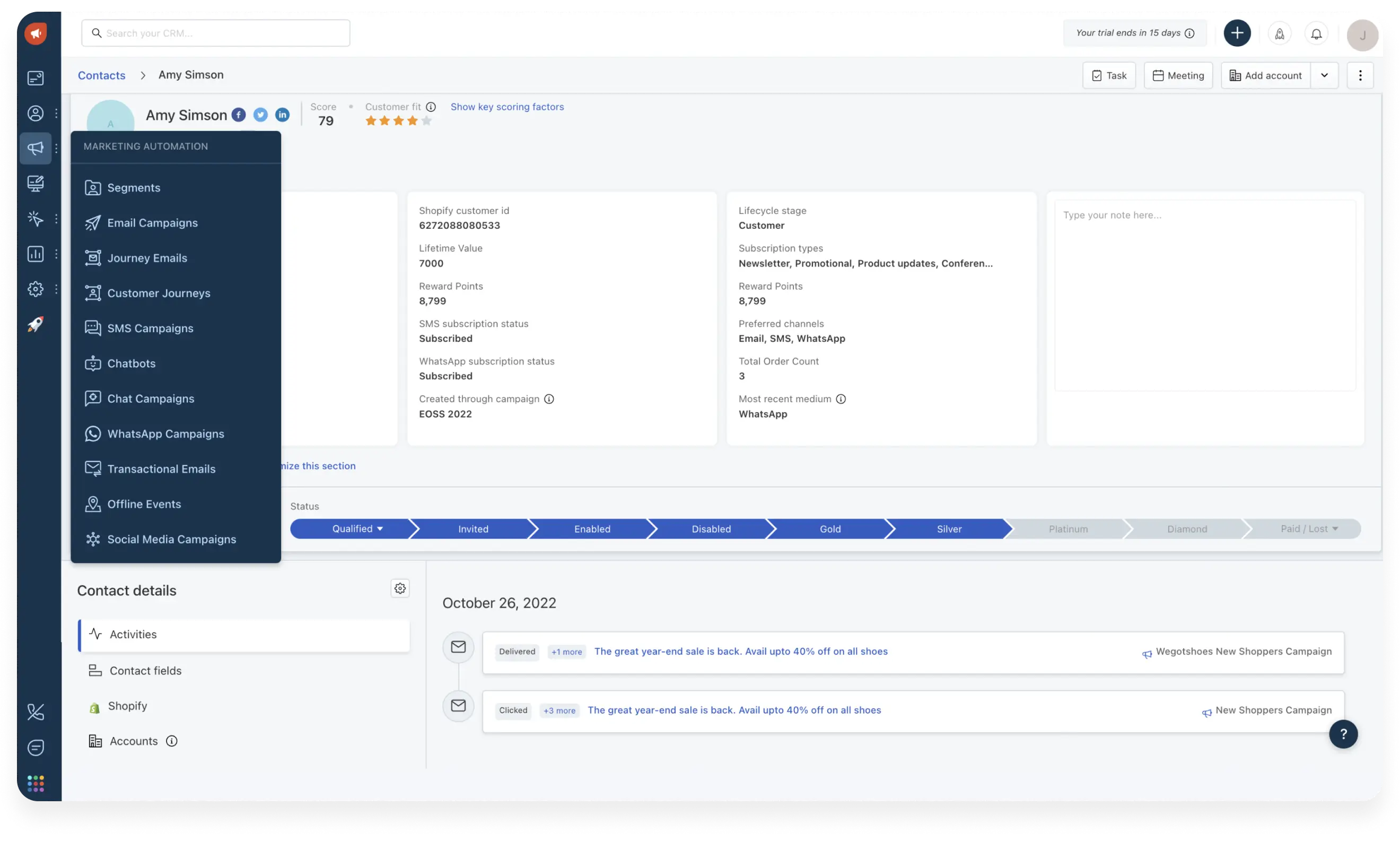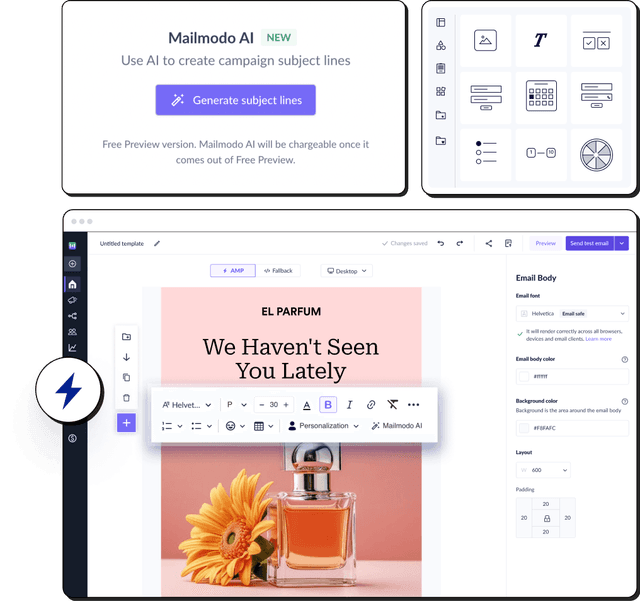If your marketing strategy is strong, but your time is limited, and your to-do list is cluttered with routine tasks, it's time to consider marketing automation software. The goal is to free up your time for more critical thinking and strategic tasks. However, not all automation software is one-size-fits-all. This guide will help you identify the right type of marketing automation software for your needs by highlighting key elements to consider in your decision-making process.
13 Best Marketing Automation Software Tools of 2026
What is marketing automation software?
Marketing automation software works based on data collected from new customer actions on different platforms, such as websites, apps, emails, etc. This data triggers action via email, SMS, push notification, in-app messaging, social media marketing, and more.
Numerous digital marketing tools empower the creation of automated workflows, but a select few stand out. Following thorough testing, here are our top twelve picks for the most effective marketing automation software.
What to look for in marketing automation software?
Having clear business goals makes it easier to know what to look for when buying marketing automation software for your business needs.
However, here are a few things you should look for:
1. Easy to implement and use
86% of marketers consider ‘Ease of Use” to be the most important factor when evaluating marketing automation software. Setting up workflow rules and integrations needs to be easy enough for a non-technical person to learn quickly and manage.
2. Scalability
Some marketing automation software products are perfect for small and medium enterprises. The business does not have to buy other software to supplement the gaps. Then, there are enterprise-grade software products with all the bells and whistles, including email marketing campaigns.
3. Integration with your peripheral systems
Will your marketing automation system integrate with the engagement platforms of your choice? It is a good idea to see a working demo before finalization.
4. Reports and analytics
What you cannot measure, you cannot improve. Reports and analytics, including customer data, are critical for planning better and more effective campaigns, as they provide valuable insights into campaign performance. While it applies to any marketing tool, it is especially important for an automaton tool because it is the best place to capture the data points needed for the A/B testing, measuring ROI, etc.
5. Pricing model
Pricing can make or break your deal.
Understand if the software has a free trial. If yes, what features are part of the free trial? What do paid versions include, and what are the pricing slabs?
- Check prices as per your growth projections. You will know if the price is scalable with your growth.
- Remember to understand the additional costs of extra channels, contacts, and emails.
- What tools are part of the core offering, and what features are add-ons? Many marketers gets burnt by hidden costs that emerge only after implementation.
Comparing the best marketing automation software
You can rely on some automation software tools to amp up your marketing game. Here's a list of some of the most robust and reliable marketing automation tools to use in 2024:
1. Mailmodo
Mailmodo takes a pragmatic approach to marketing automation. Rather than overwhelming you with complex setup requirements, it provides AI tools that helps you automate lifecycle campaigns efficiently while maintaining high-quality personalization.
The platform includes AI Journey Builder, which interprets natural-language prompts to build automated workflows with triggers, delays, and branching logic. It also includes an AI Template Generator that converts a simple campaign idea into a ready-to-send email layout, complete with structured sections and suggested content.

Your AI Assistant for Everything Email Marketing

Features:
- Include a straightforward and easy-to-navigate interface, making it accessible for users with varying levels of technical expertise.
- The platform provides drag-and-drop builders that simplify the marketing process and aid in creating visually appealing emails without the need for extensive technical skills.
- Mailmodo's automation features are designed to support triggered campaigns, allowing for personalized and timely communication with users.

Best for: Businesses wanting to automate transactional emails and personalization marketing tasks.
Pros and Cons:
| Pros | Cons |
|---|---|
| User-friendly Interface | - |
| Visually Appealing Email Creation | - |
| Robust Automation Features | - |
Integration:
✅ Mailmodo offers integration with your marketing, developer, and connectors stack, including Hubspot, Zapier, Shopify, Salesforce, and many more.
Pricing:
| Plan | Price | Email sending credits |
|---|---|---|
| Free | $0 | 4,000 |
| Lite | $39/month (billed annually) | 20,000 |
| Pro | $79/month (billed annually) | 25,000 |
| Max | $159/month (billed annually) | 37,500 |
2. Customer.io:
Customer.io stands out as a versatile customer communication platform, excelling in the realm of personalized messaging. Designed to empower businesses, Customer.io enables the delivery of targeted messages based on user actions, solidifying its position as a powerful tool for enhancing customer engagement and retention.
Features:
- It strongly emphasizes personalized messaging, allowing businesses to tailor their communication to individual user preferences and behaviors.
- The platform boasts robust segmentation capabilities, enabling businesses to categorize their audience into distinct segments based on various criteria.
- Customer.io's strength lies in its ability to initiate campaigns based on user behavior, ensuring that messages are timely, relevant, and aligned with user actions.

Source: Customer.io
Best for: Large enterprises
Pros and Cons:
| Pros | Cons |
|---|---|
| Personalized messaging for impactful communication | Learning curve for beginners may require technical knowledge |
| Powerful segmentation capabilities for targeted campaigns | - |
| Behavior-triggered campaigns enhance user engagement | - |
Integration:
✅ You can track message metrics such as sent, opened, clicked, and converted events by integrating with tools like Amplitude, Mixpanel, Rudderstack, and Segment. For forms, you can integrate tools like Jotform and Typeform.
Pricing:
Free trial: ❌
| Plan | Profiles | Number of Emails | Price |
|---|---|---|---|
| Essentials | 5,000 | 1 million | $100/mo |
| Premium | Custom | Custom | $1,000/mo |
| Enterprise | Custom | Custom | Talk to sales |
3. Eloqua:
Eloqua, part of the Oracle Marketing Cloud, stands out as an enterprise-level marketing automation tool designed to meet the sophisticated needs of large-scale businesses. Eloqua's comprehensive suite of features includes advanced analytics, lead scoring, and robust automation capabilities. While seamlessly integrating with Oracle products, Eloqua's power lies in its ability to provide in-depth insights through analytics.
Features:
- Eloqua boasts features tailored for enterprise-level marketing needs.
- Whether it's an advanced analytics, lead scoring mechanisms or robust automation capabilities, Eloqua is designed to handle complex marketing workflows at scale.
- For businesses investing in Oracle products, Eloqua offers seamless integration, creating a unified marketing ecosystem. This integration allows for a holistic approach, streamlining processes and enhancing efficiency.

Source: Oracle
Best for: Small and large enterprises
Pros and Cons:
| Pros | Cons |
|---|---|
| Enterprise-level features | High learning curve |
| Advanced analytics | May be overwhelming for smaller businesses |
| Seamless integration with Oracle products | - |
Integration:
✅ Eloqua provides supported and ready-to-use integrations with major CRM tools like Oracle sales, Salesforce, and Microsoft Dynamics CRM.
Pricing:
Free trial: ❌
Eloqua does not provide any pricing information. Contact the sales team in order to know about the product and pricing.
4. Constant Contact:
Constant Contact positions itself as an all-in-one marketing platform designed specifically for small to medium-sized businesses (SMBs). It encompasses a range of functionalities, including email marketing, social media management, and basic e-commerce features, offering a comprehensive solution to address diverse marketing needs.
Features:
- Create automated messaging paths to engage with your contacts gradually, nurturing leads and maintaining consistent communication.
- Easily map out the "who, what, and when" of your messaging strategy, letting automation manage your marketing efforts efficiently.
- Constant Contact's email automation puts your messaging on autopilot, ensuring your emails and texts are delivered to the right person at the right time.

Best for: Small and medium-sized businesses
Pros and cons:
| Pros | Cons |
|---|---|
| User-Friendly Interface | Limited Advanced Features |
| All-in-One Marketing Solution | May Not Scale Well for Larger Enterprises |
| Integration with various marketing Platforms | - |
Integration:
✅ Constant Contact offers various types of integrations like Facebook and Google ads, WordPress, Salesforce, Eventbrite, Shopify, and many more.
Pricing:
| Contacts | Lite | Standard | Premium |
|---|---|---|---|
| 0-500 | $12/mo. | $35/mo. | $80/mo. |
| 501-1,000 | $30/mo. | $55/mo. | $110/mo. |
| 1,001-2,500 | $50/mo. | $75/mo. | $150/mo. |
| 5,001-10,000 | $120/mo. | $160/mo. | $275/mo. |
| 15,001-20,000 | $230/mo. | $260/mo. | $375/mo. |
| 25,001-30,000 | $310/mo. | $340/mo. | $455/mo. |
| 35,001-40,000 | $370/mo. | $400/mo. | $515/mo. |
| 45,001-50,000 | $430/mo. | $460/mo. | $575/mo. |
| 50,000+ | Contact sales | Contact sales | Contact sales |
5. Omnisend:
Omnisend has established itself as a leader in omnichannel marketing automation platforms for eCommerce. Powerful email automation workflows, with pre-built templates keeping online merchants in mind, help you hit the ground running. The basic offering is focused mainly on email and SMS marketing. However, larger enterprises will benefit from Omnisend’s channel management features.
Features:
- Omnisend offers segmentation tools and automated workflows, mainly with email and messaging.
- Segmentation tools help you find the best audience. A campaign builder can automate resending campaigns and offers A/B testing.
- Automated workflows can also work cross-channel from email to messaging. Omnisend has many pre-built workflows that you can customize.

Best for: Small and large eCommerce companies will benefit from Omnisend features.
Pros and cons:
| Pros | Cons |
|---|---|
| Free version available | Non-eCommerce companies may not find it well-tailored |
| Pre-built workflow email templates | No custom/scheduled reports |
| Create, and schedule personalized text campaigns | No native mobile app |
Integration:
✅ Omnisend offers 130+ integrations, including Facebook Ads, Mailchimp, Zapier, Intercom, Shopify, Woocommerce, etc.
Pricing:
| Number of Contacts | Free | Standard | Pro |
|---|---|---|---|
| 0-250 | $0/mo | $16/mo | $25/mo |
| 1k - 1.5k | NA | $25/mo | $59/mo |
| 4.5k - 5k | NA | $65/mo | $90/mo |
| 9k - 10k | NA | $115/mo | $150/mo |
| 13.5k - 15k | NA | $180/mo | $290/mo |
| 45k - 50k | NA | $330/mo | $650/mo |
| 70k - 75k | NA | $520/mo | $900/mo |
| 95k - 100k | NA | $720/mo | $1150/mo |
| 115k - 120k | NA | $880/mo | $1350/mo |
| 145k - 150k | NA | $1120/mo | $1650/mo |
6.Marketo
Marketo is a SaaS platform that helps businesses automate their marketing teams, efforts, and engagement. Marketo helps you streamline marketing efforts, enhance personalization, and achieve significant improvements in revenue performance, campaign efficiency, and overall deal velocity.
Features:
- Leverage AI to build and segment your audience based on demographics, firmographics, and cross-channel behavior.
- Easily personalize various touchpoints, including web pages, emails, social media, advertising, SMS, and events.
- Support the lead-to-revenue process for more effective collaboration between marketing and sales.
- Set up automated campaigns that respond in real time to customer interactions, such as form submissions, website visits, or changes in lead scores.
Pros and cons:
| Pros | Cons |
|---|---|
| Offers a wide variety of tools | No free version or trial version is available |
| AI-based audience segmentation | eCommerce platform integrations are not supported |
Integration:
Marketo offers very limited integration with Adobe Workfront that lets you see your campaigns go from ideation to execution.
Pricing:
| Features | Growth | Select | Prime | Ultimate |
|---|---|---|---|---|
| Users | 10 | 25 | 25 | 25 |
| API Calls (Daily) | 20k | 50k | 50k | 50k |
7. ActiveCampaign
ActiveCampaign is another market favorite. It is a marketing automation tool that targets all businesses. It combines the functionality of a CRM with email marketing in a marketing automation platform. It also helps create meaningful connections on social media, email, and client chat.
Features:
- Visualize and design complex automation workflows using the Automation Map.
- Utilize dynamic content capabilities to personalize emails, landing pages, and other customer interactions.
- Automate various marketing tasks, such as welcome series, through email automation and engagement scoring.
- Track user events across various channels, including email interactions, website visits, and more.

Best for: Works best for small and medium-sized businesses.
Pros and cons:
| Pros | Cons |
|---|---|
| Great for small and medium-sized businesses | Reporting not up to the mark |
| Excellent visual automation workflow builder | Works best with Active Campaign CRM, which may not be as good as other CRMs in the market |
Pricing:
Free trial: ❌
| Number of Contacts | Lite | Plus | Professional |
|---|---|---|---|
| 1k | $39/mo | $70/mo | NA |
| 2.5k | $61/mo | $125/mo | $187/mo |
| 5k | $99/mo | $186/mo | $262/mo |
| 10k | $174/mo | $287/mo | $424/mo |
| 25k | $286/mo | $474/mo | $686/mo |
| 50k | $486/mo | $699/mo | $1011/mo |
| >50k | Custom | Custom | Custom |
8. EngageBay
EngageBay is an affordable CRM software designed for small businesses and startups. It provides growing companies with the tools they need to scale and succeed.
Features:
- The most popular EngageBay feature includes the visual multistep automation builder.
- EngageBay offers a suite of customer support tools, including live chat, helpdesk, canned responses, and knowledge bases.
- Automate lead scoring in EngageBay by setting triggers for actions like email opens, link clicks, and website visits, saving time on lead qualification.
- EngageBay provides customer segmentation tools, allowing you to tag customers and execute intelligent, personalized marketing campaigns efficiently.
Pros and cons:
| Pros | Cons |
|---|---|
| All-in-one marketing, sales, and customer support platform | Marketing automation is only available in the Growth plan |
| One of the most affordable CRM systems | Advanced tools like account-based marketing are only available in the Pro plan |
| Offers powerful automation tools to help you create multistep and multi-faceted workflows | No search marketing feature yet |
Integration:
✅You can integrate EngageBay with various other tools like Zapier, Shopify, LinkedIn, Sendgrid, etc.
Pricing:
Free trial: ❌
EngageBay offers email automation as a feature in only two of their pricing plan, as follows:
| Plan | Contacts | Price |
|---|---|---|
| Growth | 5,000 | $64.99 |
| Pro | Unlimited | $119.99 |
9. Freshmarketer
Freshmarketer is a full-fledged marketing automation solution in a larger Freshworks ecosystem. Marketers use Freshmarketer to run lifecycle campaigns, build lead nurturing workflows, analyze prospect behavior, and personalized communication.
Features:
- Engage with buyers seamlessly across email, WhatsApp, SMS, live chat, social media, and more, ensuring consistent multichannel experiences through a unified solution.
- Refine audiences based on purchases, behavior, and preferences, or use predefined segments like new customers, returning customers, one-time purchases, abandoned carts, etc., for personalized messages that boost conversions.
- Leverage ready-to-use cross-channel campaigns to automate tasks at scale. Choose from 20+ e-commerce journey templates, 150+ customizable email templates, and chatbot templates for WISMO, FAQs, checkout, and discounts.

Source: Freshmarketer
Best for: Freshmarketer is an obvious choice for companies already using products from the Freshworks ecosystem. Both small and large enterprises can use Freshmarketer.
Pros and cons:
| Pros | Cons |
|---|---|
| Seamlessly integrates with Freshdesk, Freshworks CRM, and Freshservice | No help with segmentation, dynamic content, or sales analytics |
Integration:
✅You can install various integrations in your Freshmarketer tool, including Slack, Google Analytics, Shopify, Mailchimp, etc.
Pricing:
| Plan | Contacts | Price |
|---|---|---|
| Free | 100 | $0 |
| Growth | 2000 | $23/mo. |
| Pro | 5000 | $179/mo. |
| Enterprise | 10000 | $359/mo. |
10. HubSpot
HubSpot is a popular marketing software with marketing automation tools. It is great for inbound marketing. It is easy to use with a visual workflow builder. HubSpot Academy offers powerful resources for learning marketing automation from experts.
Features:
- Use intuitive workflows and bot builders in HubSpot's marketing automation software to effortlessly create and manage automated campaigns.
- Automate routine tasks such as email campaigns and form submissions, saving time and ensuring consistency in your marketing efforts.
- Extend your campaigns seamlessly across multiple channels, including SMS and in-product marketing, for a comprehensive and integrated approach.
- Craft a great and personalized experience for your leads at scale by leveraging automation tools like workflows, chatbots, and email triggers.

Best for: Hubspot is an excellent choice for small businesses.
Pros and cons:
| Pros | Cons |
|---|---|
| Free version available | Free version does not contain most automation features |
| Can create campaigns | Costly add-ons |
| Great analytics | Very expensive as you grow |
| Great for small businesses looking to grow faster | No pre-built templates |
Integration:
✅ From marketing to commerce, Hubspot has a set of more than 1500 integrations that you can use to make your automation even more effective.
Pricing:
| Plan | Contacts | Price |
|---|---|---|
| Professional | 2000 | $800/mo. |
| Enterprise | 10000 | $3600/mo. |
11. Pardot by Salesforce
Pardot is a B2B marketing automation platform offered by Salesforce for marketing and sales. It aims to help businesses streamline everything from lead generation to sales automation.
Features:
- Pardot streamlines lead management with CRM integration, email marketing, nurturing, scoring, and ROI reporting. Align marketing and sales for efficient lead generation and qualification.
- It helps with lead management by tracking all user activities on your website. It helps with lead scoring and grading.
- Helps you understand each step, from click to close. It also has a visual editor that helps to build complex workflows.
Source: Salesforce
Best for: Pardot is an excellent choice for large and B2B enterprises, especially ones already using Salesforce.
Pros and cons:
| Pros | Cons |
|---|---|
| Allows scheduled social postings, insights on viewer interaction and across multiple channels | No free plan |
| Helps with cold and inactive leads | Cannot create and configure customer journey-based advertisements |
Integration:
Pardot does not provide many integrations as of now. You can use it along with Salesforce.
Pricing:
Free trial: ❌
| Plan | Price |
|---|---|
| Growth | $1,250+ /mo. |
| Plus | $2,500+ /mo. |
| Advanced | $4,000+ /mo. |
12. CleverTap
CleverTap is a SaaS-based mobile marketing and customer lifecycle management. You can group users into real-time segments and perfect your audience with its robust automated segmentation tool.
Features:
- Offers automated user targeting in real-time. You can target by action, inaction, or property.
- Its automation tools allow users to be automatically segmented, campaigns to be triggered based on activity, and user journeys to be built and visualized.
- Track user groups instantly based on their current in-app behavior, seizing timely opportunities for targeted interactions.
- Add date or time properties to segments, allowing tracking of user behaviors at specific times, such as those ordering delivery at a particular time.
Best for: CleverTap works best for mobile marketing initiatives.
Pros and cons:
| Pros | Cons |
|---|---|
| Excellent real-time analytics | No Free Version is available |
| Clear visualization of the customer journey | Focused only on mobile and not on the website |
| Intuitive and easy to use | Costly for small organizations |
Integration: ❌
Pricing:
Free trial: ❌
Contact sales for demo and pricing details.
Related guide: How to Send AMP Emails From CleverTap Using Mailmodo
13. DataFeedWatch
DataFeedWatch offers a Google Shopping feed automation tool that helps clean up and optimize product feeds for Google Merchant Center. It supports error-free feeds, bulk edits, and A/B tests for finding winning variants.
Features:
- Automated mapping - pre-loaded feed templates
- Advanced product feed rules and custom labels- for advanced optimization
- A/B testing - experiment and pick the best variants
- Product exclusions - to control your advertising budget
- Feed review&sycnchronization - for clean and error-free feed
Pros and cons:
| Pros | Cons |
|---|---|
| Full control over content included in product listings | The interface isn’t intuitive for first-time users of a feed management tool |
| Automated synchronization of product changes between the store and Google Merchant Center | Learning curve - arises from the tool’s numerous features, with many being on an advanced level |
| Excellent support | Costly for small organizations |
Integration: ✅ Google Shopping and 2000+ other channels and marketplaces
Pricing:
| Plan | Price |
|---|---|
| Free | $0 |
| Shop | $64/mo. |
| Merchant | $84/mo. |
| Agency | $196/mo. |
| Enterprise | $599/mo. |
Wrap up
You should now understand how to evaluate and shortlist the best marketing automation software for your needs. Once the marketing automation system is set up successfully, you can scroll through these marketing automation examples to allow you and your team more time to brainstorm more strategic ideas and meet your KPIs faster.
Frequently asked questions
Marketing automation software is a set of tools and technologies designed to streamline, automate, and measure marketing tasks and workflows, allowing businesses to enhance efficiency and achieve better results in their marketing efforts.
In 2024, the business landscape is highly competitive, and marketing automation plays a crucial role in helping companies stay ahead. It allows for personalized and targeted communication, lead nurturing, and improved customer engagement, ultimately leading to increased revenue.
Marketing automation tools offer various benefits, including time savings, improved targeting, better lead management, enhanced customer experience, and the ability to track and measure marketing performance more effectively.
Key features to consider include lead nurturing, email marketing, analytics and reporting, social media integration, CRM integration, ease of use, scalability, and customer support.
Yes, many marketing automation tools cater to the needs of small businesses. It's essential to choose a solution that aligns with the size and requirements of your business.
What should you do next?
You made it till the end! Here's what you can do next to grow your business:

Get smarter with email resources
Free guides, ebooks, and other resources to master email marketing.

Do interactive email marketing with Mailmodo
Send forms, carts, calendars, games and more within your emails to boost ROI.

Consult an email expert
30-min free email consultation with an expert to fix your email marketing.
You might also like
Enter with an idea.
Exit with a winning email campaign.

Brainstorm email campaign ideas with Mailmodo’s AI assistant

Build precise segments in seconds with AI segmentation

Generate ready-to-use email templates with AI
Experience true AI email marketing automation with Mailmodo
Trusted by 10000+ brands





